Doug Dillon's Blog, page 22
September 12, 2016
Race and Ethnicity in YA Book Series for At-Risk Kids
Florida teacher pens diverse, paranormal/historical novels now being used in high school classrooms.
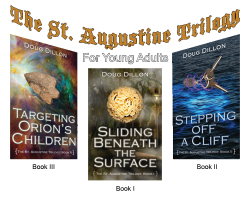 The St. Augustine Trilogy
The St. Augustine Trilogy
Book 1: Sliding Beneath the Surface 154 reviews on Amazon.com and reviewed by the St. Augustine Herald.
Book 3: Targeting Orion’s Children
After retiring from teaching in Florida schools, I decided to start writing novels in addition to publishing nonfiction books and articles. And since I had spent so many years working with teens, YA fiction was a very natural and fun path to take.
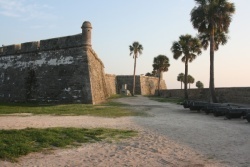
The Castillo de San Marcos
In the selection of a setting, I immediately chose nearby St. Augustine, America’s oldest city, one of my favorite places to visit. Having been a history teacher, I couldn’t resist inserting my characters into an environment with such a rich past.
And, of course, that would also allow me to once again slip a little history education into the minds of my young adult readers. The characters would exist in the present day but would then be thrown back in time to actual historical events.
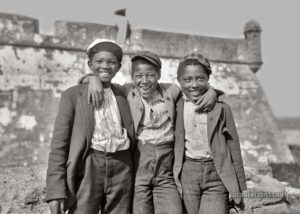
St. Augustine, 1902
But in thinking about the bygone days of St. Augustine, and who my characters should be, the issues of race and diversity popped into the forefront of my mind. I very consciously wanted to write for a diverse population, and also address the multicultural aspects of the Oldest City’s past. But how to effectively combine those two goals was the question.
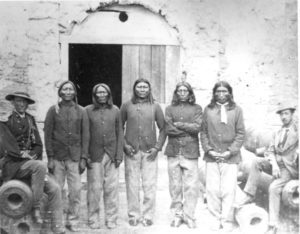
Plains Indians jailed at the Castillo de San Marcos in 1879.
To come up with a solution, I looked carefully at St. Augustine’s background and decided that I should do my best to have characters who represented the city’s main founding groups. Not only that, but to really make it work, those characters should also have roots going way back into the history of that region of Florida.
So, the three main groups in the founding and building of St. Augustine were as follows:
Native Americans, who lived in that location before the arrival of Europeans and who were brought to the city to work on the building of the Castillo de San Marcos (the stone Spanish fort, completed in 1695 and still part of the city), bring to the city needed supplies, work for the local population, or who were imprisoned by the U.S. Government there at the Castillo.
African Slaves and Free Blacks, who were brought to that location to serve the local population, work on the building of the Castillo de San Marcos, or to protect the city.
The Europeans. Specifically, the Spanish, but later the English and then the white Americans.

Jeff
And now, let me introduce you to the trilogy’s four main characters who represent the above groups in various ways:
Jeff Golden: (Leading character). Jeff is fifteen and white with an American/English heritage. His five times great-grandfather fought in the initial battle that began the Second Seminole War in Florida. Even though he is smart, Jeff is also an angry, rebellious, at-risk kid from a very dysfunctional family. He attends St. Augustine High School. Jeff hates school and teachers, reads very little and takes pride in manipulating adults.

Carla
Carla Rodriquez: Carla, Jeff’s girlfriend is also fifteen. She is a Black Hispanic whose ancestor was Luis Pacheco, an African Slave. Pacheco was forced to serve the U.S. Army as a scout and interpreter for the very military unit Jeff’s five times great-grandfather served in at the start of the Second Seminole War (Pacheco’s story is true). Carla is very smart, takes only AP classes and is very level-headed.
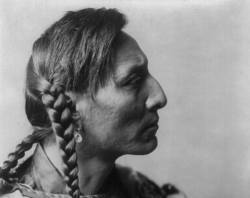
Lobo
Lobo: This gentleman is a mysterious and powerful Native American shaman who guides Jeff and Carla through their dangerous paranormal journeys. He is big, old, brilliant, tough and doesn’t put up with nonsense.
Lobo’s linkages to St. Augustine’s past go back in time in ways that astound Jeff and Carla. His part in the diversity picture expands book by book in the trilogy until it explodes in the most unexpected way at its end.
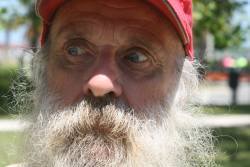
Lyle
Lyle the Homeless Guy: Lyle is a contemporary of Lobo’s. But at some point in the very distant past, he had a terrible accident that left him somewhat mentally unstable, an alcoholic and often afraid of his own shadow. Lyle is white, his original heritage is English, and his St. Augustine background almost rivals that of Lobo.
Now, to be honest, I toyed with the idea of making the lead character African-American, but then I backed away from that idea. Why? Well, as an old white guy, I just didn’t know if I was up to it in first person, to be blunt. On the other hand, I thought I had a much better chance of making the secondary character, Carla, a Black Hispanic and doing justice to her as an individual and to the role she pays in the books.
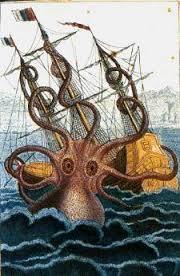 At this point, I hope you can see the blending I mentioned before of the characters’ backgrounds with the history of St. Augustine. BUT, embarking on such a journey can be perilous because if you don’t do it properly, the writing comes across as heavy-handed and didactic. And if young people feel they are being set up and preached to, the result often isn’t pretty.
At this point, I hope you can see the blending I mentioned before of the characters’ backgrounds with the history of St. Augustine. BUT, embarking on such a journey can be perilous because if you don’t do it properly, the writing comes across as heavy-handed and didactic. And if young people feel they are being set up and preached to, the result often isn’t pretty.
So with that caution in mind, I have tried diligently to gently insert multicultural aspects into these novels simply as a natural flow from who these characters are and how their backgrounds add to the stories. Put another way, my intention has been to build organically from the needs of the plot and through the interpersonal communications between the characters.
 Apparently, from the input I’ve gotten, my approached has worked. So what is that input? First of all, the reviews I’ve gotten is my initial feedback and second of all, the reactions I’ve gotten in speaking to very diverse groups of high school students who have read the book tell me what I need to know.
Apparently, from the input I’ve gotten, my approached has worked. So what is that input? First of all, the reviews I’ve gotten is my initial feedback and second of all, the reactions I’ve gotten in speaking to very diverse groups of high school students who have read the book tell me what I need to know.
In fact, while visiting students at the first school to use Book 1 of the trilogy, I got hugs, smiles and handshakes from students entering that classroom all day, well before we had any interaction. Very gratifying, especially when I never thought my novels would be used in schools. My original intent was just to write some good books, have fun doing it, sell them online and hopefully make a difference in at least a few lives.
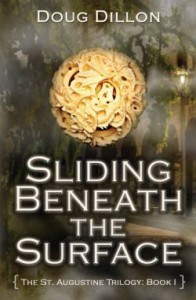 And at this point, I am so delighted to see my work being used, or soon will be used, by fellow educators that I have made the following no cost commitments to them as follows:
And at this point, I am so delighted to see my work being used, or soon will be used, by fellow educators that I have made the following no cost commitments to them as follows:
Consultations about the books and their use by simply using by communications with me through the Contact Form on this website. From that point on by email and phone.
Sending out a detailed online Teacher Guide via email.
Sending out a Photo Disk via snail mail with a ton of pictures showing St. Augustine, the characters, historical reenactments, trilogy graphics and more. Oh, and a printed contents guide for the disk.
Click here to see more information on teacher resources.
Well, there you have it. If you’re interested in any more details, below you will find a bunch of links that offer further insights into the trilogy:
Reading Help for At-Risk Kids. An overview of the trilogy’s use in reading classrooms.
Reading Motivation That Worked. The original article published about the author’s efforts with the original teacher who used Book 1 of the trilogy with all of her students.
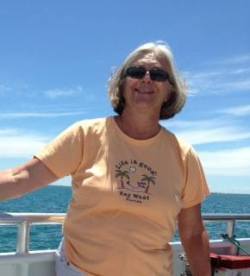
Katy Snyder – the first reading teacher in Florida to use the trilogy in her reading classes.
Reading Teacher Sparks Student Interest. An article from the first teacher to use the trilogy in her classes.
A book Series for the Reading Classroom. The multiple themes and threads woven into the series.
Main Characters in the St. Augustine Trilogy. A brief introduction.
The St. Augustine Trilogy and America’s Oldest City. The setting for the series in St. Augustine, Florida and how that provides a fascinating backdrop for action.
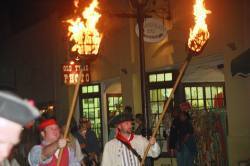
Pirates parade in the streets of old St. Augustine
The St. Augustine Trilogy & Historic Events. Specifies the actual historic events that happened in America’s oldest city that integral parts of the series.
Teaching History Through Young Adult Novels. An analysis.
Teaching Resilience Through Young Adult Novels. Targeting at-risk kids and the teachers who work with them.
Click the following in order to see the two trilogy novels presently in print, and their reviews, as currently listed on amazon.com:
Race and Ethnicity in YA Book Series for Reading Classes
Florida teacher pens diverse, paranormal/historical novels now being used in high school classrooms.
 The St. Augustine Trilogy
The St. Augustine Trilogy
Book 1: Sliding Beneath the Surface 154 reviews on Amazon.com and reviewed by the St. Augustine Herald.
Book 3: Targeting Orion’s Children
After retiring from teaching in Florida schools, I decided to start writing novels in addition to publishing nonfiction books and articles. And since I had spent so many years working with teens, YA fiction was a very natural and fun path to take.

The Castillo de San Marcos
In the selection of a setting, I immediately chose nearby St. Augustine, America’s oldest city, one of my favorite places to visit. Having been a history teacher, I couldn’t resist inserting my characters into an environment with such a rich past.
And, of course, that would also allow me to once again slip a little history education into the minds of my young adult readers. The characters would exist in the present day but would then be thrown back in time to actual historical events.

St. Augustine, 1902
But in thinking about the bygone days of St. Augustine, and who my characters should be, the issues of race and diversity popped into the forefront of my mind. I very consciously wanted to write for a diverse population, and also address the multicultural aspects of the Oldest City’s past. But how to effectively combine those two goals was the question.

Plains Indians jailed at the Castillo de San Marcos in 1879.
To come up with a solution, I looked carefully at St. Augustine’s background and decided that I should do my best to have characters who represented the city’s main founding groups. Not only that, but to really make it work, those characters should also have roots going way back into the history of that region of Florida.
So, the three main groups in the founding and building of St. Augustine were as follows:
Native Americans, who lived in that location before the arrival of Europeans and who were brought to the city to work on the building of the Castillo de San Marcos (the stone Spanish fort, completed in 1695 and still part of the city), bring to the city needed supplies, work for the local population, or who were imprisoned by the U.S. Government there at the Castillo.
African Slaves and Free Blacks, who were brought to that location to serve the local population, work on the building of the Castillo de San Marcos, or to protect the city.
The Europeans. Specifically, the Spanish, but later the English and then the white Americans.

Jeff
And now, let me introduce you to the trilogy’s four main characters who represent the above groups in various ways:
Jeff Golden: (Leading character). Jeff is fifteen and white with an American/English heritage. His five times great-grandfather fought in the initial battle that began the Second Seminole War in Florida. Even though he is smart, Jeff is also an angry, rebellious, at-risk kid from a very dysfunctional family. He attends St. Augustine High School. Jeff hates school and teachers, reads very little and takes pride in manipulating adults.

Carla
Carla Rodriquez: Carla, Jeff’s girlfriend is also fifteen. She is a Black Hispanic whose ancestor was Luis Pacheco, an African Slave. Pacheco was forced to serve the U.S. Army as a scout and interpreter for the very military unit Jeff’s five times great-grandfather served in at the start of the Second Seminole War (Pacheco’s story is true). Carla is very smart, takes only AP classes and is very level-headed.

Lobo
Lobo: This gentleman is a mysterious and powerful Native American shaman who guides Jeff and Carla through their dangerous paranormal journeys. He is big, old, brilliant, tough and doesn’t put up with nonsense.
Lobo’s linkages to St. Augustine’s past go back in time in ways that astound Jeff and Carla. His part in the diversity picture expands book by book in the trilogy until it explodes in the most unexpected way at its end.

Lyle
Lyle the Homeless Guy: Lyle is a contemporary of Lobo’s. But at some point in the very distant past, he had a terrible accident that left him somewhat mentally unstable, an alcoholic and often afraid of his own shadow. Lyle is white, his original heritage is English, and his St. Augustine background almost rivals that of Lobo.
Now, to be honest, I toyed with the idea of making the lead character African-American, but then I backed away from that idea. Why? Well, as an old white guy, I just didn’t know if I was up to it in first person, to be blunt. On the other hand, I thought I had a much better chance of making the secondary character, Carla, a Black Hispanic and doing justice to her as an individual and to the role she pays in the books.
 At this point, I hope you can see the blending I mentioned before of the characters’ backgrounds with the history of St. Augustine. BUT, embarking on such a journey can be perilous because if you don’t do it properly, the writing comes across as heavy-handed and didactic. And if young people feel they are being set up and preached to, the result often isn’t pretty.
At this point, I hope you can see the blending I mentioned before of the characters’ backgrounds with the history of St. Augustine. BUT, embarking on such a journey can be perilous because if you don’t do it properly, the writing comes across as heavy-handed and didactic. And if young people feel they are being set up and preached to, the result often isn’t pretty.
So with that caution in mind, I have tried diligently to gently insert multicultural aspects into these novels simply as a natural flow from who these characters are and how their backgrounds add to the stories. Put another way, my intention has been to build organically from the needs of the plot and through the interpersonal communications between the characters.
 Apparently, from the input I’ve gotten, my approached has worked. So what is that input? First of all, the reviews I’ve gotten is my initial feedback and second of all, the reactions I’ve gotten in speaking to very diverse groups of high school students who have read the book tell me what I need to know.
Apparently, from the input I’ve gotten, my approached has worked. So what is that input? First of all, the reviews I’ve gotten is my initial feedback and second of all, the reactions I’ve gotten in speaking to very diverse groups of high school students who have read the book tell me what I need to know.
In fact, while visiting students at the first school to use Book 1 of the trilogy, I got hugs, smiles and handshakes from students entering that classroom all day, well before we had any interaction. Very gratifying, especially when I never thought my novels would be used in schools. My original intent was just to write some good books, have fun doing it, sell them online and hopefully make a difference in at least a few lives.
 And at this point, I am so delighted to see my work being used, or soon will be used, by fellow educators that I have made the following no cost commitments to them as follows:
And at this point, I am so delighted to see my work being used, or soon will be used, by fellow educators that I have made the following no cost commitments to them as follows:
Consultations about the books and their use by simply using by communications with me through the Contact Form on this website. From that point on by email and phone.
Sending out a detailed online Teacher Guide via email.
Sending out a Photo Disk via snail mail with a ton of pictures showing St. Augustine, the characters, historical reenactments, trilogy graphics and more. Oh, and a printed contents guide for the disk.
Click here to see more information on teacher resources.
Well, there you have it. If you’re interested in any more details, below you will find a bunch of links that offer further insights into the trilogy:
Reading Help for At-Risk Kids. An overview of the trilogy’s use in reading classrooms.
Reading Motivation That Worked. The original article published about the author’s efforts with the original teacher who used Book 1 of the trilogy with all of her students.

Katy Snyder – the first reading teacher in Florida to use the trilogy in her reading classes.
Reading Teacher Sparks Student Interest. An article from the first teacher to use the trilogy in her classes.
A book Series for the Reading Classroom. The multiple themes and threads woven into the series.
Main Characters in the St. Augustine Trilogy. A brief introduction.
The St. Augustine Trilogy and America’s Oldest City. The setting for the series in St. Augustine, Florida and how that provides a fascinating backdrop for action.

Pirates parade in the streets of old St. Augustine
The St. Augustine Trilogy & Historic Events. Specifies the actual historic events that happened in America’s oldest city that integral parts of the series.
Teaching History Through Young Adult Novels. An analysis.
Teaching Resilience Through Young Adult Novels. Targeting at-risk kids and the teachers who work with them.
Click the following in order to see the two trilogy novels presently in print, and their reviews, as currently listed on amazon.com:
A Diverse YA Trilogy for At-Risk Kids
Florida teacher pens multicultural, paranormal/historical novels now being used in high school classrooms.
 The St. Augustine Trilogy
The St. Augustine Trilogy
Book 1: Sliding Beneath the Surface 154 reviews on Amazon.com and reviewed by the St. Augustine Herald.
Book 3: Targeting Orion’s Children
After retiring from teaching in Florida schools, I decided to start writing novels in addition to publishing nonfiction books and articles. And since I had spent so many years working with teens, YA fiction was a very natural and fun path to take.

The Castillo de San Marcos
In the selection of a setting, I immediately chose nearby St. Augustine, America’s oldest city, one of my favorite places to visit. Having been a history teacher, I couldn’t resist inserting my characters into an environment with such a rich past.
And, of course, that would also allow me to once again slip a little history education into the minds of my young adult readers. The characters would exist in the present day but would then be thrown back in time to actual historical events.

St. Augustine, 1902
But in thinking about the bygone days of St. Augustine, and who my characters should be, the issues of race and diversity popped into the forefront of my mind. I very consciously wanted to write for a diverse population, and also address the multicultural aspects of the Oldest City’s past. But how to effectively combine those two goals was the question.

Plains Indians jailed at the Castillo de San Marcos in 1879.
To come up with a solution, I looked carefully at St. Augustine’s background and decided that I should do my best to have characters who represented the city’s main founding groups. Not only that, but to really make it work, those characters should also have roots going way back into the history of that region of Florida.
So, the three main groups in the founding and building of St. Augustine were as follows:
Native Americans, who lived in that location before the arrival of Europeans and who were brought to the city to work on the building of the Castillo de San Marcos (the stone Spanish fort, completed in 1695 and still part of the city), bring to the city needed supplies, work for the local population, or who were imprisoned by the U.S. Government there at the Castillo.
African Slaves and Free Blacks, who were brought to that location to serve the local population, work on the building of the Castillo de San Marcos, or to protect the city.
The Europeans. Specifically, the Spanish, but later the English and then the white Americans.

Jeff
And now, let me introduce you to the trilogy’s four main characters who represent the above groups in various ways:
Jeff Golden: (Leading character). Jeff is fifteen and white with an American/English heritage. His five times great-grandfather fought in the initial battle that began the Second Seminole War in Florida. Even though he is smart, Jeff is also an angry, rebellious, at-risk kid from a very dysfunctional family. He attends St. Augustine High School. Jeff hates school and teachers, reads very little and takes pride in manipulating adults.

Carla
Carla Rodriquez: Carla, Jeff’s girlfriend is also fifteen. She is a Black Hispanic whose ancestor was Luis Pacheco, an African Slave. Pacheco was forced to serve the U.S. Army as a scout and interpreter for the very military unit Jeff’s five times great-grandfather served in at the start of the Second Seminole War (Pacheco’s story is true). Carla is very smart, takes only AP classes and is very level-headed.

Lobo
Lobo: This gentleman is a mysterious and powerful Native American shaman who guides Jeff and Carla through their dangerous paranormal journeys. He is big, old, brilliant, tough and doesn’t put up with nonsense.
Lobo’s linkages to St. Augustine’s past go back in time in ways that astound Jeff and Carla. His part in the diversity picture expands book by book in the trilogy until it explodes in the most unexpected way at its end.

Lyle
Lyle the Homeless Guy: Lyle is a contemporary of Lobo’s. But at some point in the very distant past, he had a terrible accident that left him somewhat mentally unstable, an alcoholic and often afraid of his own shadow. Lyle is white, his original heritage is English, and his St. Augustine background almost rivals that of Lobo.
Now, to be honest, I toyed with the idea of making the lead character African-American, but then I backed away from that idea. Why? Well, as an old white guy, I just didn’t know if I was up to it in first person, to be blunt. On the other hand, I thought I had a much better chance of making the secondary character, Carla, a Black Hispanic and doing justice to her as an individual and to the role she pays in the books.
 At this point, I hope you can see the blending I mentioned before of the characters’ backgrounds with the history of St. Augustine. BUT, embarking on such a journey can be perilous because if you don’t do it properly, the writing comes across as heavy-handed and didactic. And if young people feel they are being set up and preached to, the result often isn’t pretty.
At this point, I hope you can see the blending I mentioned before of the characters’ backgrounds with the history of St. Augustine. BUT, embarking on such a journey can be perilous because if you don’t do it properly, the writing comes across as heavy-handed and didactic. And if young people feel they are being set up and preached to, the result often isn’t pretty.
So with that caution in mind, I have tried diligently to gently insert multicultural aspects into these novels simply as a natural flow from who these characters are and how their backgrounds add to the stories. Put another way, my intention has been to build organically from the needs of the plot and through the interpersonal communications between the characters.
 Apparently, from the input I’ve gotten, my approached has worked. So what is that input? First of all, the reviews I’ve gotten is my initial feedback and second of all, the reactions I’ve gotten in speaking to very diverse groups of high school students who have read the book tell me what I need to know.
Apparently, from the input I’ve gotten, my approached has worked. So what is that input? First of all, the reviews I’ve gotten is my initial feedback and second of all, the reactions I’ve gotten in speaking to very diverse groups of high school students who have read the book tell me what I need to know.
In fact, while visiting students at the first school to use Book 1 of the trilogy, I got hugs, smiles and handshakes from students entering that classroom all day, well before we had any interaction. Very gratifying, especially when I never thought my novels would be used in schools. My original intent was just to write some good books, have fun doing it, sell them online and hopefully make a difference in at least a few lives.
 And at this point, I am so delighted to see my work being used, or soon will be used, by fellow educators that I have made the following no cost commitments to them as follows:
And at this point, I am so delighted to see my work being used, or soon will be used, by fellow educators that I have made the following no cost commitments to them as follows:
Consultations about the books and their use by simply using by communications with me through the Contact Form on this website. From that point on by email and phone.
Sending out a detailed online Teacher Guide via email.
Sending out a Photo Disk via snail mail with a ton of pictures showing St. Augustine, the characters, historical reenactments, trilogy graphics and more. Oh, and a printed contents guide for the disk.
Click here to see more information on teacher resources.
Well, there you have it. If you’re interested in any more details, below you will find a bunch of links that offer further insights into the trilogy:
Reading Help for At-Risk Kids. An overview of the trilogy’s use in reading classrooms.
Reading Motivation That Worked. The original article published about the author’s efforts with the original teacher who used Book 1 of the trilogy with all of her students.

Katy Snyder – the first reading teacher in Florida to use the trilogy in her reading classes.
Reading Teacher Sparks Student Interest. An article from the first teacher to use the trilogy in her classes.
A book Series for the Reading Classroom. The multiple themes and threads woven into the series.
Main Characters in the St. Augustine Trilogy. A brief introduction.
The St. Augustine Trilogy and America’s Oldest City. The setting for the series in St. Augustine, Florida and how that provides a fascinating backdrop for action.

Pirates parade in the streets of old St. Augustine
The St. Augustine Trilogy & Historic Events. Specifies the actual historic events that happened in America’s oldest city that integral parts of the series.
Teaching History Through Young Adult Novels. An analysis.
Teaching Resilience Through Young Adult Novels. Targeting at-risk kids and the teachers who work with them.
Click the following in order to see the two trilogy novels presently in print, and their reviews, as currently listed on amazon.com:
September 11, 2016
Resilience, Troubled Teens and Books
 At-risk kids, life skills and reading.
At-risk kids, life skills and reading.
The St. Augustine Trilogy – aiming for at-risk young people, using the paranormal, the historical and science fiction:
Book I Sliding Beneath the Surface
Book III Targeting Orion’s Children
My young adult series attracts a variety of readers, a lot of teens of course, and many adults in their twenties and thirties. And in that overall group, as I had hoped, are often a lot young people who live troubled lives.
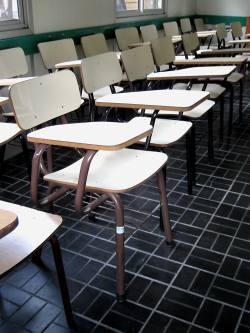 You see, I’m a former secondary school educator who spent the last ten years of my educational career working full-time with at-risk kids. I worked for Orange County Public Schools which covers the Orlando area of Central Florida.
You see, I’m a former secondary school educator who spent the last ten years of my educational career working full-time with at-risk kids. I worked for Orange County Public Schools which covers the Orlando area of Central Florida.
In that capacity, if I wasn’t setting up and monitoring programs from the district level, I was actually in schools working directly with students and their families.
Drug/alcohol use, suicide attempts, child abuse and even murder were some of the issues I dealt with over years.
I tell you all this because, as a writer, I decided to make a main thread in my book series relate to personal development, decision-making, responsibility and overcoming overwhelming challenges.
The premise of The St. Augustine Trilogy then becomes this: You Create Your Own Reality.
So many of the kids I worked with felt they were stuck in the quicksands of life and had no capacity for self change to make thing better that I had to make one last attempt at reaching others like them.

Jeff
To do that, I created the character of fifteen-year-old Jeff Golden who is a composite of all those young people I dealt with for so long. Jeff comes from a deeply dysfunctional home.
He is angry at the world and it is always somebody else’s fault for whatever happens to him.Using the first person, I have Jeff speak directly to the reader as if he is speaking with a friend.
And to make life even worse for Jeff, I inundate him with wild paranormal/science fiction-type occurrences.
Young adult readers eat that kind of stuff up and it gives me a chance to really put the pressure on the main character. For Jeff, it becomes change or be destroyed.
But to the rescue comes Lobo, the tough, mysterious, Native American Shaman. Oh, and Carla, Jeff’s girlfriend, who is smart, strong and has her head on straight.
It is through this joint guidance and modeling that Jeff learns to use the natural inner strengths that he never realized he possessed.
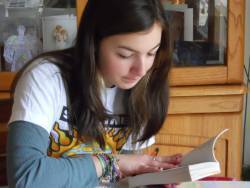 And at-risk kids who read my books GET IT! Whether reading my stories truly helps them or not, of course, I don’t know. But after visiting classrooms filled with such young people who read one of my books as a class project, I know the possibility exists.
And at-risk kids who read my books GET IT! Whether reading my stories truly helps them or not, of course, I don’t know. But after visiting classrooms filled with such young people who read one of my books as a class project, I know the possibility exists.
They see Jeff’s gradual maturation and what he had to do to get to those stages of development. And for that I am extremely happy. If I have helped just one kid in this process it will have been well worth the effort.
As a side light, I put the trilogy’s location in America’s oldest and most haunted city, St. Augustine, Florida. This gives me the perfect setting for the spooky aspects of the series and allows the old history teacher in me to come out and play. What great fun to sneak in some lessons about the past and not meet resistance.
The Trilogy Used as Motivation and Skill Building in High School Reading Classes
What has been most interesting and gratifying is seeing high school reading teachers successfully use the trilogy books with those at-risk kids in their classrooms. Here are a couple of links to other post that will tell you all about that.
At-Risk Students and Reading (A full overview of the reading project)
Reading Motivation that Worked (The original high school reading project post)
Rewarding Reading Excellence in Schools (The trilogy used as a reward)
So there you have it. Below are the trailers for the two trilogy books already in print. And below that are some more links in order for you to fill in in any of the blanks:
Sliding Beneath the Surface
Stepping Off a Cliff
Trilogy Locations in St. Augustine, FL
The Main Characters in The St. Augustine Trilogy
Teaching History Through Young Adult Novels
Teen Trilogy Builds Resilience
 At-risk kids, life skills and reading.
At-risk kids, life skills and reading.
The St. Augustine Trilogy – aiming for at-risk young people, using the paranormal, the historical and science fiction:
Book I Sliding Beneath the Surface
Book III Targeting Orion’s Children
My young adult series attracts a variety of readers, a lot of teens of course, and many adults in their twenties and thirties. And in that overall group, as I had hoped, are often a lot young people who live troubled lives.
 You see, I’m a former secondary school educator who spent the last ten years of my educational career working full-time with at-risk kids. I worked for Orange County Public Schools which covers the Orlando area of Central Florida.
You see, I’m a former secondary school educator who spent the last ten years of my educational career working full-time with at-risk kids. I worked for Orange County Public Schools which covers the Orlando area of Central Florida.
In that capacity, if I wasn’t setting up and monitoring programs from the district level, I was actually in schools working directly with students and their families.
Drug/alcohol use, suicide attempts, child abuse and even murder were some of the issues I dealt with over years.
I tell you all this because, as a writer, I decided to make a main thread in my book series relate to personal development, decision-making, responsibility and overcoming overwhelming challenges.
The premise of The St. Augustine Trilogy then becomes this: You Create Your Own Reality.
So many of the kids I worked with felt they were stuck in the quicksands of life and had no capacity for self change to make thing better that I had to make one last attempt at reaching others like them.

Jeff
To do that, I created the character of fifteen-year-old Jeff Golden who is a composite of all those young people I dealt with for so long. Jeff comes from a deeply dysfunctional home.
He is angry at the world and it is always somebody else’s fault for whatever happens to him.Using the first person, I have Jeff speak directly to the reader as if he is speaking with a friend.
And to make life even worse for Jeff, I inundate him with wild paranormal/science fiction-type occurrences.
Young adult readers eat that kind of stuff up and it gives me a chance to really put the pressure on the main character. For Jeff, it becomes change or be destroyed.
But to the rescue comes Lobo, the tough, mysterious, Native American Shaman. Oh, and Carla, Jeff’s girlfriend, who is smart, strong and has her head on straight.
It is through this joint guidance and modeling that Jeff learns to use the natural inner strengths that he never realized he possessed.
 And at-risk kids who read my books GET IT! Whether reading my stories truly helps them or not, of course, I don’t know. But after visiting classrooms filled with such young people who read one of my books as a class project, I know the possibility exists.
And at-risk kids who read my books GET IT! Whether reading my stories truly helps them or not, of course, I don’t know. But after visiting classrooms filled with such young people who read one of my books as a class project, I know the possibility exists.
They see Jeff’s gradual maturation and what he had to do to get to those stages of development. And for that I am extremely happy. If I have helped just one kid in this process it will have been well worth the effort.
As a side light, I put the trilogy’s location in America’s oldest and most haunted city, St. Augustine, Florida. This gives me the perfect setting for the spooky aspects of the series and allows the old history teacher in me to come out and play. What great fun to sneak in some lessons about the past and not meet resistance.
The Trilogy Used as Motivation and Skill Building in High School Reading Classes
What has been most interesting and gratifying is seeing high school reading teachers successfully use the trilogy books with those at-risk kids in their classrooms. Here are a couple of links to other post that will tell you all about that.
At-Risk Students and Reading (A full overview of the reading project)
Reading Motivation that Worked (The original high school reading project post)
Rewarding Reading Excellence in Schools (The trilogy used as a reward)
So there you have it. Below are the trailers for the two trilogy books already in print. And below that are some more links in order for you to fill in in any of the blanks:
Sliding Beneath the Surface
Stepping Off a Cliff
Trilogy Locations in St. Augustine, FL
The Main Characters in The St. Augustine Trilogy
Teaching History Through Young Adult Novels
Teen Book Series Builds Resilience
 At-risk kids, life skills and reading.
At-risk kids, life skills and reading.
The St. Augustine Trilogy – aiming for at-risk young people, using the paranormal, the historical and science fiction:
Book I Sliding Beneath the Surface
Book III Targeting Orion’s Children
My young adult series attracts a variety of readers, a lot of teens of course, and many adults in their twenties and thirties. And in that overall group, as I had hoped, are often a lot young people who live troubled lives.
 You see, I’m a former secondary school educator who spent the last ten years of my educational career working full-time with at-risk kids. I worked for Orange County Public Schools which covers the Orlando area of Central Florida.
You see, I’m a former secondary school educator who spent the last ten years of my educational career working full-time with at-risk kids. I worked for Orange County Public Schools which covers the Orlando area of Central Florida.
In that capacity, if I wasn’t setting up and monitoring programs from the district level, I was actually in schools working directly with students and their families.
Drug/alcohol use, suicide attempts, child abuse and even murder were some of the issues I dealt with over years.
I tell you all this because, as a writer, I decided to make a main thread in my book series relate to personal development, decision-making, responsibility and overcoming overwhelming challenges.
The premise of The St. Augustine Trilogy then becomes this: You Create Your Own Reality.
So many of the kids I worked with felt they were stuck in the quicksands of life and had no capacity for self change to make thing better that I had to make one last attempt at reaching others like them.

Jeff
To do that, I created the character of fifteen-year-old Jeff Golden who is a composite of all those young people I dealt with for so long. Jeff comes from a deeply dysfunctional home.
He is angry at the world and it is always somebody else’s fault for whatever happens to him.Using the first person, I have Jeff speak directly to the reader as if he is speaking with a friend.
And to make life even worse for Jeff, I inundate him with wild paranormal/science fiction-type occurrences.
Young adult readers eat that kind of stuff up and it gives me a chance to really put the pressure on the main character. For Jeff, it becomes change or be destroyed.
But to the rescue comes Lobo, the tough, mysterious, Native American Shaman. Oh, and Carla, Jeff’s girlfriend, who is smart, strong and has her head on straight.
It is through this joint guidance and modeling that Jeff learns to use the natural inner strengths that he never realized he possessed.
 And at-risk kids who read my books GET IT! Whether reading my stories truly helps them or not, of course, I don’t know. But after visiting classrooms filled with such young people who read one of my books as a class project, I know the possibility exists.
And at-risk kids who read my books GET IT! Whether reading my stories truly helps them or not, of course, I don’t know. But after visiting classrooms filled with such young people who read one of my books as a class project, I know the possibility exists.
They see Jeff’s gradual maturation and what he had to do to get to those stages of development. And for that I am extremely happy. If I have helped just one kid in this process it will have been well worth the effort.
As a side light, I put the trilogy’s location in America’s oldest and most haunted city, St. Augustine, Florida. This gives me the perfect setting for the spooky aspects of the series and allows the old history teacher in me to come out and play. What great fun to sneak in some lessons about the past and not meet resistance.
The Trilogy Used as Motivation and Skill Building in High School Reading Classes
What has been most interesting and gratifying is seeing high school reading teachers successfully use the trilogy books with those at-risk kids in their classrooms. Here are a couple of links to other post that will tell you all about that.
At-Risk Students and Reading (A full overview of the reading project)
Reading Motivation that Worked (The original high school reading project post)
Rewarding Reading Excellence in Schools (The trilogy used as a reward)
So there you have it. Below are the trailers for the two trilogy books already in print. And below that are some more links in order for you to fill in in any of the blanks:
Sliding Beneath the Surface
Stepping Off a Cliff
Trilogy Locations in St. Augustine, FL
The Main Characters in The St. Augustine Trilogy
Teaching History Through Young Adult Novels
Building Resilience in At-Risk Teens
 At-risk kids, life skills and reading.
At-risk kids, life skills and reading.
The St. Augustine Trilogy – aiming for at-risk young people, using the paranormal, the historical and science fiction:
Book I Sliding Beneath the Surface
Book III Targeting Orion’s Children
My young adult series attracts a variety of readers, a lot of teens of course, and many adults in their twenties and thirties. And in that overall group, as I had hoped, are often a lot young people who live troubled lives.
 You see, I’m a former secondary school educator who spent the last ten years of my educational career working full-time with at-risk kids. I worked for Orange County Public Schools which covers the Orlando area of Central Florida.
You see, I’m a former secondary school educator who spent the last ten years of my educational career working full-time with at-risk kids. I worked for Orange County Public Schools which covers the Orlando area of Central Florida.
In that capacity, if I wasn’t setting up and monitoring programs from the district level, I was actually in schools working directly with students and their families.
Drug/alcohol use, suicide attempts, child abuse and even murder were some of the issues I dealt with over years.
I tell you all this because, as a writer, I decided to make a main thread in my book series relate to personal development, decision-making, responsibility and overcoming overwhelming challenges.
The premise of The St. Augustine Trilogy then becomes this: You Create Your Own Reality.
So many of the kids I worked with felt they were stuck in the quicksands of life and had no capacity for self change to make thing better that I had to make one last attempt at reaching others like them.

Jeff
To do that, I created the character of fifteen-year-old Jeff Golden who is a composite of all those young people I dealt with for so long. Jeff comes from a deeply dysfunctional home.
He is angry at the world and it is always somebody else’s fault for whatever happens to him.Using the first person, I have Jeff speak directly to the reader as if he is speaking with a friend.
And to make life even worse for Jeff, I inundate him with wild paranormal/science fiction-type occurrences.
Young adult readers eat that kind of stuff up and it gives me a chance to really put the pressure on the main character. For Jeff, it becomes change or be destroyed.
But to the rescue comes Lobo, the tough, mysterious, Native American Shaman. Oh, and Carla, Jeff’s girlfriend, who is smart, strong and has her head on straight.
It is through this joint guidance and modeling that Jeff learns to use the natural inner strengths that he never realized he possessed.
 And at-risk kids who read my books GET IT! Whether reading my stories truly helps them or not, of course, I don’t know. But after visiting classrooms filled with such young people who read one of my books as a class project, I know the possibility exists.
And at-risk kids who read my books GET IT! Whether reading my stories truly helps them or not, of course, I don’t know. But after visiting classrooms filled with such young people who read one of my books as a class project, I know the possibility exists.
They see Jeff’s gradual maturation and what he had to do to get to those stages of development. And for that I am extremely happy. If I have helped just one kid in this process it will have been well worth the effort.
As a side light, I put the trilogy’s location in America’s oldest and most haunted city, St. Augustine, Florida. This gives me the perfect setting for the spooky aspects of the series and allows the old history teacher in me to come out and play. What great fun to sneak in some lessons about the past and not meet resistance.
The Trilogy Used as Motivation and Skill Building in High School Reading Classes
What has been most interesting and gratifying is seeing high school reading teachers successfully use the trilogy books with those at-risk kids in their classrooms. Here are a couple of links to other post that will tell you all about that.
At-Risk Students and Reading (A full overview of the reading project)
Reading Motivation that Worked (The original high school reading project post)
Rewarding Reading Excellence in Schools (The trilogy used as a reward)
So there you have it. Below are the trailers for the two trilogy books already in print. And below that are some more links in order for you to fill in in any of the blanks:
Sliding Beneath the Surface
Stepping Off a Cliff
Trilogy Locations in St. Augustine, FL
The Main Characters in The St. Augustine Trilogy
Teaching History Through Young Adult Novels
Teaching About the Paranormal Using Young Adult Novels
Building Resilience Through Reading
 At-risk kids, life skills and reading.
At-risk kids, life skills and reading.
The St. Augustine Trilogy – aiming for at-risk young people, using the paranormal, the historical and science fiction:
Book I Sliding Beneath the Surface
Book III Targeting Orion’s Children
My young adult series attracts a variety of readers, a lot of teens of course, and many adults in their twenties and thirties. And in that overall group, as I had hoped, are often a lot young people who live troubled lives.
 You see, I’m a former secondary school educator who spent the last ten years of my educational career working full-time with at-risk kids. I worked for Orange County Public Schools which covers the Orlando area of Central Florida.
You see, I’m a former secondary school educator who spent the last ten years of my educational career working full-time with at-risk kids. I worked for Orange County Public Schools which covers the Orlando area of Central Florida.
In that capacity, if I wasn’t setting up and monitoring programs from the district level, I was actually in schools working directly with students and their families.
Drug/alcohol use, suicide attempts, child abuse and even murder were some of the issues I dealt with over years.
I tell you all this because, as a writer, I decided to make a main thread in my book series relate to personal development, decision-making, responsibility and overcoming overwhelming challenges.
The premise of The St. Augustine Trilogy then becomes this: You Create Your Own Reality.
So many of the kids I worked with felt they were stuck in the quicksands of life and had no capacity for self change to make thing better that I had to make one last attempt at reaching others like them.

Jeff
To do that, I created the character of fifteen-year-old Jeff Golden who is a composite of all those young people I dealt with for so long. Jeff comes from a deeply dysfunctional home.
He is angry at the world and it is always somebody else’s fault for whatever happens to him.Using the first person, I have Jeff speak directly to the reader as if he is speaking with a friend.
And to make life even worse for Jeff, I inundate him with wild paranormal/science fiction-type occurrences.
Young adult readers eat that kind of stuff up and it gives me a chance to really put the pressure on the main character. For Jeff, it becomes change or be destroyed.
But to the rescue comes Lobo, the tough, mysterious, Native American Shaman. Oh, and Carla, Jeff’s girlfriend, who is smart, strong and has her head on straight.
It is through this joint guidance and modeling that Jeff learns to use the natural inner strengths that he never realized he possessed.
 And at-risk kids who read my books GET IT! Whether reading my stories truly helps them or not, of course, I don’t know. But after visiting classrooms filled with such young people who read one of my books as a class project, I know the possibility exists.
And at-risk kids who read my books GET IT! Whether reading my stories truly helps them or not, of course, I don’t know. But after visiting classrooms filled with such young people who read one of my books as a class project, I know the possibility exists.
They see Jeff’s gradual maturation and what he had to do to get to those stages of development. And for that I am extremely happy. If I have helped just one kid in this process it will have been well worth the effort.
As a side light, I put the trilogy’s location in America’s oldest and most haunted city, St. Augustine, Florida. This gives me the perfect setting for the spooky aspects of the series and allows the old history teacher in me to come out and play. What great fun to sneak in some lessons about the past and not meet resistance.
The Trilogy Used as Motivation and Skill Building in High School Reading Classes
What has been most interesting and gratifying is seeing high school reading teachers successfully use the trilogy books with those at-risk kids in their classrooms. Here are a couple of links to other post that will tell you all about that.
At-Risk Students and Reading (A full overview of the reading project)
Reading Motivation that Worked (The original high school reading project post)
Rewarding Reading Excellence in Schools (The trilogy used as a reward)
So there you have it. Below are the trailers for the two trilogy books already in print. And below that are some more links in order for you to fill in in any of the blanks:
Sliding Beneath the Surface
Stepping Off a Cliff
Trilogy Locations in St. Augustine, FL
The Main Characters in The St. Augustine Trilogy
Teaching History Through Young Adult Novels
Building Resilience in At Risk Kids
 At-risk kids, life skills and reading.
At-risk kids, life skills and reading.
The St. Augustine Trilogy – aiming for at-risk young people, using the paranormal, the historical and science fiction:
Book I Sliding Beneath the Surface
Book III Targeting Orion’s Children
My young adult series attracts a variety of readers, a lot of teens of course, and many adults in their twenties and thirties. And in that overall group, as I had hoped, are often a lot young people who live troubled lives.
 You see, I’m a former secondary school educator who spent the last ten years of my educational career working full-time with at-risk kids. I worked for Orange County Public Schools which covers the Orlando area of Central Florida.
You see, I’m a former secondary school educator who spent the last ten years of my educational career working full-time with at-risk kids. I worked for Orange County Public Schools which covers the Orlando area of Central Florida.
In that capacity, if I wasn’t setting up and monitoring programs from the district level, I was actually in schools working directly with students and their families.
Drug/alcohol use, suicide attempts, child abuse and even murder were some of the issues I dealt with over years.
I tell you all this because, as a writer, I decided to make a main thread in my book series relate to personal development, decision-making, responsibility and overcoming overwhelming challenges.
The premise of The St. Augustine Trilogy then becomes this: You Create Your Own Reality.
So many of the kids I worked with felt they were stuck in the quicksands of life and had no capacity for self change to make thing better that I had to make one last attempt at reaching others like them.

Jeff
To do that, I created the character of fifteen-year-old Jeff Golden who is a composite of all those young people I dealt with for so long. Jeff comes from a deeply dysfunctional home.
He is angry at the world and it is always somebody else’s fault for whatever happens to him.Using the first person, I have Jeff speak directly to the reader as if he is speaking with a friend.
And to make life even worse for Jeff, I inundate him with wild paranormal/science fiction-type occurrences.
Young adult readers eat that kind of stuff up and it gives me a chance to really put the pressure on the main character. For Jeff, it becomes change or be destroyed.
But to the rescue comes Lobo, the tough, mysterious, Native American Shaman. Oh, and Carla, Jeff’s girlfriend, who is smart, strong and has her head on straight.
It is through this joint guidance and modeling that Jeff learns to use the natural inner strengths that he never realized he possessed.
 And at-risk kids who read my books GET IT! Whether reading my stories truly helps them or not, of course, I don’t know. But after visiting classrooms filled with such young people who read one of my books as a class project, I know the possibility exists.
And at-risk kids who read my books GET IT! Whether reading my stories truly helps them or not, of course, I don’t know. But after visiting classrooms filled with such young people who read one of my books as a class project, I know the possibility exists.
They see Jeff’s gradual maturation and what he had to do to get to those stages of development. And for that I am extremely happy. If I have helped just one kid in this process it will have been well worth the effort.
As a side light, I put the trilogy’s location in America’s oldest and most haunted city, St. Augustine, Florida. This gives me the perfect setting for the spooky aspects of the series and allows the old history teacher in me to come out and play. What great fun to sneak in some lessons about the past and not meet resistance.
The Trilogy Used as Motivation and Skill Building in High School Reading Classes
What has been most interesting and gratifying is seeing high school reading teachers successfully use the trilogy books with those at-risk kids in their classrooms. Here are a couple of links to other post that will tell you all about that.
At-Risk Students and Reading (A full overview of the reading project)
Reading Motivation that Worked (The original high school reading project post)
Rewarding Reading Excellence in Schools (The trilogy used as a reward)
So there you have it. Below are the trailers for the two trilogy books already in print. And below that are some more links in order for you to fill in in any of the blanks:
Sliding Beneath the Surface
Stepping Off a Cliff
Trilogy Locations in St. Augustine, FL
The Main Characters in The St. Augustine Trilogy
Teaching History Through Young Adult Novels
Appealing to At-Risk Kids Through Reading
 At-risk kids, life skills and reading.
At-risk kids, life skills and reading.
The St. Augustine Trilogy – aiming for at-risk young people, using the paranormal, the historical and science fiction:
Book I Sliding Beneath the Surface
Book III Targeting Orion’s Children
My young adult series attracts a variety of readers, a lot of teens of course, and many adults in their twenties and thirties. And in that overall group, as I had hoped, are often a lot young people who live troubled lives.
 You see, I’m a former secondary school educator who spent the last ten years of my educational career working full-time with at-risk kids. I worked for Orange County Public Schools which covers the Orlando area of Central Florida.
You see, I’m a former secondary school educator who spent the last ten years of my educational career working full-time with at-risk kids. I worked for Orange County Public Schools which covers the Orlando area of Central Florida.
In that capacity, if I wasn’t setting up and monitoring programs from the district level, I was actually in schools working directly with students and their families.
Drug/alcohol use, suicide attempts, child abuse and even murder were some of the issues I dealt with over years.
I tell you all this because, as a writer, I decided to make a main thread in my book series relate to personal development, decision-making, responsibility and overcoming overwhelming challenges.
The premise of The St. Augustine Trilogy then becomes this: You Create Your Own Reality.
So many of the kids I worked with felt they were stuck in the quicksands of life and had no capacity for self change to make thing better that I had to make one last attempt at reaching others like them.

Jeff
To do that, I created the character of fifteen-year-old Jeff Golden who is a composite of all those young people I dealt with for so long. Jeff comes from a deeply dysfunctional home.
He is angry at the world and it is always somebody else’s fault for whatever happens to him.Using the first person, I have Jeff speak directly to the reader as if he is speaking with a friend.
And to make life even worse for Jeff, I inundate him with wild paranormal/science fiction-type occurrences.
Young adult readers eat that kind of stuff up and it gives me a chance to really put the pressure on the main character. For Jeff, it becomes change or be destroyed.
But to the rescue comes Lobo, the tough, mysterious, Native American Shaman. Oh, and Carla, Jeff’s girlfriend, who is smart, strong and has her head on straight.
It is through this joint guidance and modeling that Jeff learns to use the natural inner strengths that he never realized he possessed.
 And at-risk kids who read my books GET IT! Whether reading my stories truly helps them or not, of course, I don’t know. But after visiting classrooms filled with such young people who read one of my books as a class project, I know the possibility exists.
And at-risk kids who read my books GET IT! Whether reading my stories truly helps them or not, of course, I don’t know. But after visiting classrooms filled with such young people who read one of my books as a class project, I know the possibility exists.
They see Jeff’s gradual maturation and what he had to do to get to those stages of development. And for that I am extremely happy. If I have helped just one kid in this process it will have been well worth the effort.
As a side light, I put the trilogy’s location in America’s oldest and most haunted city, St. Augustine, Florida. This gives me the perfect setting for the spooky aspects of the series and allows the old history teacher in me to come out and play. What great fun to sneak in some lessons about the past and not meet resistance.
The Trilogy Used as Motivation and Skill Building in High School Reading Classes
What has been most interesting and gratifying is seeing high school reading teachers successfully use the trilogy books with those at-risk kids in their classrooms. Here are a couple of links to other post that will tell you all about that.
At-Risk Students and Reading (A full overview of the reading project)
Reading Motivation that Worked (The original high school reading project post)
Rewarding Reading Excellence in Schools (The trilogy used as a reward)
So there you have it. Below are the trailers for the two trilogy books already in print. And below that are some more links in order for you to fill in in any of the blanks:
Sliding Beneath the Surface
Stepping Off a Cliff
Trilogy Locations in St. Augustine, FL
The Main Characters in The St. Augustine Trilogy
Teaching History Through Young Adult Novels



